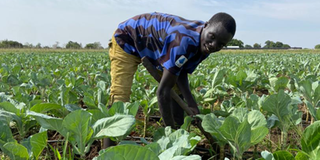How irrigation has helped in drought

A farmer tends to his crops at Apuwai Iririgation Scheme in Tororo District on Saturday last week. PHOTO | OLIVIER MUKAAYA
The construction of a solar-powered irrigation scheme in Kwapa Sub-county, Tororo District, has helped to turn the semi- arid land into fertility.
The area, which is mostly known for subsistence farming and cattle keeping, faces the challenge of a long dry spell and poor soils worsened by erratic rainfall, every year.
But this is changing after the construction of Apuwai Irrigation Scheme with which locals are using to grow crops such as cabbages, tomatoes, onions and red pepper.
Such crops are part of the enterprises selected by the government under Parish Development Model (PDM), the new strategy to fight poverty.
The irrigation scheme, which sits on 13 acres, was constructed by the Ministry of Water and Environment from November 2020 and completed in February.
Mr Okware Michael Ochilakor, one of the farmers, says irrigation technology has brought life to the community.
“We could rarely grow anything here because the area is drought prone and had become worse due to climate change,” he says.
Mr Ochilakor said since the scheme started, they have grown cabbages, onions, tomatoes, green paper and tomatoes from which they have earned money to sustain their families.
Benefits
He says in their first harvest, they got Shs25 million from the produce, which he said attracted other locals to join.
Mr Elino Elakilak, another farmer, says provision of water for production is improving their livelihoods in the community.
“The crops we are growing have ready market and are grown throughout the year due to availability of water,” Mr Elakilak says.
Ms Rose Atwani, the vice chairperson of the farmer’s group, says the irrigation scheme has promoted crop production and improved household income in the area.
Ms Rebecca Akumu, the Tororo District vice chairperson, while inspecting the scheme at the weekend, said the government is pushing for the growing of quick maturing crops as one of lucrative enterprises.
“More irrigation schemes should be constructed in other sub-counties and the farmers should be taught to add value to their produce,” she said.
Mr Jackson Osudo, the chief administrative officer, said irrigation is one of the efforts by the government to fight the problem of unpredictable rainfall.
“The government is determined to solve the problem of erratic rains and also fight food insecurity as it attempts to push the country into middle income status,” he said.
Eng Patrick Okotel, the regional manager of Water for Production, said in the next financial year, they are planning to construct more schemes.




